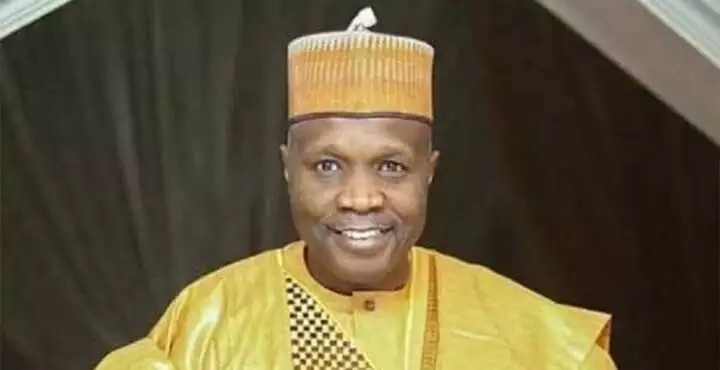By Akin Osuntokun
I could have bet my last shekels that then aspirant Bola Ahmed Tinubu was never going to emerge the presidential candidate of the All Peoples Congress, APC. I was this certain on account of the logic that no aspirant could emerge the candidate without the buy-in of the cultic and all powerful President Muhammadu Buhari. It was more or less an open secret, through contrived slips of tongue and body language that Buhari may not have made up his mind on who to hand over the reins of power to but he appeared to have been resolute on who not to.
When we replay the Abeokuta video clip,(on a campaign stump speech at the Ogun state capital, prior to the presidential primaries), of Tinubu’s open declaration of hostilities against the powers that be in the APC, it is impossible not to draw the conclusion that the then aspirant believed he had come to the end of his presidential run. It was the beginning of a series of twists and turns of disappointment turned blessing for him.
So that no one is in doubt about his intentions, Buhari has been this categorical of his desire to anoint the president who succeeds him “In keeping with the established internal policies of the Party and as we approach the Convention in a few days, therefore, I wish to solicit the reciprocity and support of the Governors and other stakeholders in picking my successor, who would fly the flag of our party for election into the office of the President of the Federal Republic of Nigeria in 2023″.
The grapevine had it that, ironically, it was Tinubu’s resolve to go for broke in Abeokuta that saved the day for his campaign. It was a plot in which the feisty first lady, Hajia Aisha Buhari, featured as Tinubu’s guardian angel. It turned out that rather than get enraged (and thereby redouble his anti Tinubu resolve) at the rude and insolent frontal attack on him, Buhari was rattled and perplexed. Privy to this crucial insider knowledge was the first lady, who whispered to her political partner to pile it on until Buhari’s resolve was reduced to tatters. She found a co conspirator in the caucus of the Northern APC governors.
With eyes set on power rotation back to the North in the near future, it was in the governors’ individual vested interest (as in presidential aspiration) that the presidency rotated to the South this time around. Haven gotten wind of Buhari’s inclination to field Ahmed Lawan as his successor, their response to the Buhari solicitation (to be given the privilege of choosing his successor) was the qualification that the party candidate must come from the South-in compliance with the North/South rotation principle. Finding himself boxed into a corner, the former President capitulated and consoled himself with option B, (to covertly back the Peoples Democratic Party, PDP, candidate, Atiku Abubakar, a fellow fulani moslem).
If therefore,Tinubu is the president of Nigeria today, it is no thanks to his predecessor. The knock-on effect of emerging president autonomous of Buhari or any godfather was a commensurate boost to his authority as president. Power is afterall the capacity to get one’s objective regardless of anyone’s contrary wishes. In the event, the APC governors sold themselves short and relieved Tinubu of any obligation of deference to them by selling themselves for a mess of pottage. The spectacle of the APC presidential primaries in Abuja was a sight to behold. It was not just the spectre of several contestants stepping down for a fellow contestant, it was the open secret of governors being financially induced to do so.
The ‘Independent National Electoral Commission’, INEC, took off from where the APC presidential primaries had left off. Prior to the presidential election, several organisations followed the routine global culture of conducting public opinion polls on the popularity of candidates. The three leading candidates were Peter Obi of the Labour Party, Atiku Abubakar of the PDP and Bola Ahmed Tinubu of the APC. Almost all of the pollsters, notably those of Bloomberg and CNN (by a wide margin) gave the election to Obi. According to the Encyclopaedia Britannica, “Opinion polls are generally conducted with statistical selection controls in place and are thus called scientific”. A singular characteristic of science, stricto sensu, is predictability. In other words, it shall make a prediction and the prediction shall come to pass.
If the overwhelming majority of the polls predicted that Obi will win the election, why then should anyone be surprised at his (non INEC certified) victory at the 2023 presidential election? At any rate, at 4am or thereabouts on March 1st 2023, INEC took its turn in the relay race of delivering the Aso presidential villa for Tinubu. Regardless of the son of soil Atiku Abubakar factor, the votes of the Northern muslims segment of the Nigerian electorate proved quite decisive in tipping Tinubu over the bar. Upon being sworn in as president, no one would have been surprised were he to opt to play the Northern proxy and reflect a Northern bias in the distribution of strategic political and public appointments. Surprisingly, he hasn’t and has thereby rendered himself liable to the unintended consequence of Buhari’s crass nepotism.
It was predictable that any correction of his lopsided governance style would be interpreted by the beneficiary Northern constituency as discrimination against them. In this projection, the extant bitter withdrawal syndrome of the Northern political elite was foretold. While the North wallows in this quiescent bitterness, the South West zone appears to have been over compensated by their son. Given the winner-takes-all context of Nigeria’s politics, and against the immediate background of Buhari’s Northernisation agenda and the remote backdrop of President Olusegun Obasanjo nationalist even handedness, Tinubu’s apparent Yoruba bias, is a remarkable political assertiveness
.
I have been a little bit surprised at the preparedness of the Yoruba intelligentsia (or a fraction thereof) to adopt the prescription of calculated realpolitik and look the other way-where the liability of the shortcomings of the President is concerned. At play here is the unresolved age old Igbo/Yoruba political angst (with Obi as the victim, this time around) and an unflattering understanding of Nigerian politics as unamenable to high ideals. Others less charitable may see the attitude as mere euphemism for political opportunism.
Taking a cue from the Republic of Niger’s political crisis in which they found common purpose with Nigeria and Ecowas (both of which are controlled by the Nigerian President) the Western powers have equally adopted Tinubu as their leading political point man in the Ecowas subregion. Given the deepening gloom and despair that have embraced Nigeria including, especially, the tragic dysfunction and disappointment of the 2023 general elections, national debate is trending back towards the inevitability of constitutional reforms, aka restructuring. It is a no brainer to reiterate that the basic leadership problem of Nigeria is political mismanagement. Reinforcing this ailment is a constitutional dysfunction which structurally predisposes and renders the political leadership prone to this political mismanagement.
The over concentration and centralisation of powers in Abuja and concomitant disinheritance and disempowerment of the states breed lopsided instability, inefficiency and abuse of power. It predisposes the constitutionally enabled wielder of the power at the centre to arbitrary, discriminatory and unaccountable exercise of power. In the words of Lord Acton, power corrupts and absolute power corrupts absolutely. Increasing immiseration has resulted in the weaponization of poverty politics and very few Nigerian political leaders have the wherewithal to deploy financial resources with devastating effect as the President.
More than any other, especially against the immediate background experience of the leadership of Buhari, the primary lesson Nigerians have learnt is that, ideally, Nigeria shouldn’t have been constituted into one country. We can draw a similar conclusion of almost all post colonial African states. But that does not amount to the logic that (haven been lumped together), we cannot make a success of the imperfect political union that was handed down to us.
The corollary of the sustained trend towards over centralisation of powers and quasi-unitary state is a drift towards dictatorship and one party state. A growing strategic shortcoming of Nigeria is the capacity to absorb and normalise any political outrage. Nigeria has arrived at a juncture in which the citizenry have become generally powerless against the will of the ascendant Nigerian political elite. It is a situation of political stupefaction where see no evil, hear no evil, say no evil has become a collective response to the prevailing gross abuse and misuse of political power. Potentially and absurd as it seems, this development can be used for the good or bad of Nigeria.
All the major indices of the political development of Nigeria had been accomplished by the fiat of civil and military dictatorship, beginning with the colonial dictatorship of the British. Be they the 1960, 1979 and 1999 constitutions. Be they the translation of the four regions of the first republic into thirty six states. In reflection of his personal history as the Nigerian army officer whose worldview and socialisation were forged within a briefly nationalistic military institution; the Nigerian war commander who received the surrender of Biafra; the military ruler who conceived and executed an unprecedented and successful transition from military rule to the civil democratic rule in 1979, Obasanjo will tell you he wants to be perceived first as a Nigerian before being acknowledged as Yoruba.
The reverse seems to be the case with Tinubu. Though a latter day rebel, he is a mentee of the Afenifere/Yoruba nationalist politics and probably aspires to be perceived as Yoruba crown prince warts and all. Inferring from the substance and style of his short stint as Nigerian President I am substantially persuaded that the legacy he cherishes before all else is to go down in history as a Yoruba hero. Now, of course, being a Yoruba hero is not mutually exclusive of being a Nigerian patriot. At any event, you cannot be a good Yoruba without being a good Nigerian and good human being.
With a reputation in free fall, Mr President requires no further compelling incentive to work towards his moral rehabilitation and he has precisely the platform and opportunity to remould his image. Nigeria lies prostrate before him. If he leaves the Nigerian constitutional status quo intact, he will not only leave Nigeria in ruins, he can kiss goodbye to any positive remembrance of him. Posterity will judge him harshly, quite deservedly.
Osuntokun, a public critic is a former presidential adviser





